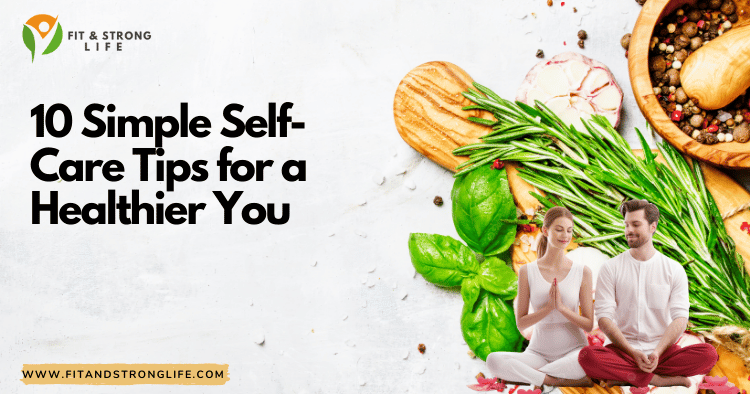Table of Contents
- Introduction
- 1. Prioritize Sleep
- 2. Stay Hydrated
- 3. Practice Mindfulness
- 4. Get Moving
- 5. Nourish Your Body
- 6. Set Boundaries
- 7. Connect with Nature
- 8. Cultivate Hobbies
- 9. Limit Screen Time
- 10. Seek Support
- Conclusion
- FAQs
Introduction
In our fast-paced lives, self-care often takes a backseat. However, taking time for yourself is crucial for maintaining mental, emotional, and physical well-being. This blog offers ten simple self-care tips that can easily fit into your daily routine, helping you foster a healthier and happier life. Let’s dive in!
1. Prioritize Sleep
Quality sleep is the foundation of good health. Aim for 7-9 hours each night and establish a relaxing bedtime routine. Simple practices such as dimming the lights, reading a book, or practicing gentle yoga can signal to your body that it’s time to wind down.
“Sleep is the best meditation.” — Dalai Lama
Tips for Better Sleep:
- Create a Sleep Schedule: Go to bed and wake up at the same time every day.
- Limit Caffeine: Avoid caffeine in the afternoon and evening.
- Optimize Your Sleep Environment: Keep your bedroom cool, dark, and quiet.
For more tips on improving your sleep quality, check out the National Sleep Foundation.
2. Stay Hydrated
Drinking enough water is essential for maintaining your body’s functions, including digestion, circulation, and temperature regulation. Aim for at least 8 glasses (64 ounces) of water a day.
“Water is the source of life; it is the fuel for our bodies.”
Hydration Tips:
- Infuse Water with Flavor: Add fruits like lemon, berries, or cucumber for a refreshing twist.
- Keep a Water Bottle Handy: A reusable bottle can serve as a constant reminder to drink up.
For hydration strategies that can enhance your fitness performance, visit our article on 10 Hydration Strategies to Boost Fitness Performance.
3. Practice Mindfulness
Mindfulness is about being present and fully engaged in the moment. This practice can reduce stress, anxiety, and depression while enhancing emotional well-being.
“Mindfulness isn’t difficult. We just need to remember to do it.” — Sharon Salzberg
Mindfulness Techniques:
- Meditation: Spend just 5-10 minutes a day focusing on your breath.
- Gratitude Journaling: Write down three things you’re grateful for each day.
Explore more about mindfulness at Mindful.org.
4. Get Moving
Regular physical activity is a cornerstone of self-care. It boosts mood, improves energy, and enhances overall health. You don’t need to run a marathon; even a brisk walk can make a difference.
“Take care of your body. It’s the only place you have to live.” — Jim Rohn
Simple Ways to Stay Active:
- Choose Activities You Enjoy: Dancing, cycling, or yoga can make exercise feel less like a chore.
- Set Small Goals: Start with 10 minutes a day and gradually increase.
For exercise recommendations, check out the CDC Physical Activity Guidelines. Additionally, explore our comprehensive list of effective workouts in Top 10 Essential Yoga Poses for Beginners.
5. Nourish Your Body
Eating a balanced diet rich in fruits, vegetables, whole grains, and lean proteins fuels your body and mind. Don’t forget to indulge in moderation!
“Let food be thy medicine, and medicine be thy food.” — Hippocrates
Healthy Eating Tips:
- Plan Your Meals: Prepare meals ahead of time to avoid unhealthy last-minute choices.
- Mindful Eating: Pay attention to your hunger cues and savor each bite.
Learn more about nutrition from ChooseMyPlate.gov. For specific nutrition tips, consider reading Top 10 Essential Vitamins and Minerals for Fitness Gains.
6. Set Boundaries
Learning to say no is crucial for your mental health. Setting boundaries protects your time and energy, allowing you to prioritize self-care.
“Boundaries aren’t just about saying no; they’re about making room for what matters.”
Boundary Setting Tips:
- Communicate Clearly: Let others know your limits.
- Practice Self-Compassion: Remember that it’s okay to prioritize yourself.
For more on setting boundaries, check out Psychology Today.
7. Connect with Nature
Spending time outdoors can significantly improve your mood and reduce feelings of stress. Nature walks, gardening, or simply enjoying a sunny day can uplift your spirits.
“In every walk with nature one receives far more than he seeks.” — John Muir
Nature Connection Ideas:
- Take a Hike: Explore local trails or parks.
- Create a Garden: Even a small windowsill herb garden can connect you with nature.
Learn more about the benefits of nature from The Nature Conservancy. You might also enjoy our article on 10 Refreshing Outdoor Yoga Poses to Energize Your Practice.
8. Cultivate Hobbies
Engaging in hobbies you love can be incredibly fulfilling. Whether it’s painting, knitting, or playing an instrument, hobbies provide an excellent outlet for stress relief.
“Hobbies are great distractions from the worries and troubles that plague our daily lives.”
Hobbies to Consider:
- Art and Crafts: Express your creativity through painting or DIY projects.
- Reading: Immerse yourself in different worlds through literature.
For hobby ideas, visit Lifehacker.
9. Limit Screen Time
Excessive screen time can lead to eye strain, disrupted sleep, and increased anxiety. Set boundaries to ensure you’re not glued to your devices.
“Almost everything will work again if you unplug it for a few minutes, including you.” — Anne Lamott
Screen Time Management:
- Establish Tech-Free Zones: Keep screens out of the bedroom and dining areas.
- Schedule Breaks: Take regular breaks from screens to recharge.
For screen time recommendations, see American Academy of Pediatrics.
10. Seek Support
Don’t hesitate to reach out for help when you need it. Whether it’s friends, family, or professionals, support can make a world of difference in your self-care journey.
“You don’t have to struggle in silence. There’s always help available.”
Finding Support:
- Talk to Friends: Share your feelings and experiences with trusted friends.
- Professional Help: Consider therapy or counseling for additional support.
Explore resources at MentalHealth.gov.
Conclusion
Incorporating self-care into your daily routine doesn’t have to be overwhelming. Start with one or two tips that resonate with you and gradually build from there. Remember, taking care of yourself is not a luxury; it’s a necessity. Embrace these simple practices and watch as you become a healthier you!
FAQs
Q: How often should I practice self-care?
A: Self-care should be a daily practice, but the intensity can vary. Listen to your body and mind to determine what feels best.
Q: What if I don’t have time for self-care?
A: Self-care can be as simple as taking a few deep breaths or enjoying a cup of tea. Even short moments of self-care can have a significant impact.
Q: Can self-care improve my mental health?
A: Yes! Regular self-care practices can reduce stress, anxiety, and depression, leading to improved mental health.
Q: How can I remind myself to practice self-care?
A: Set reminders on your phone, keep a self-care journal, or create a vision board to inspire you to prioritize self-care.
Feel free to share your thoughts or additional tips in the comments below! Remember, self-care is a journey, not a destination. Happy caring!




